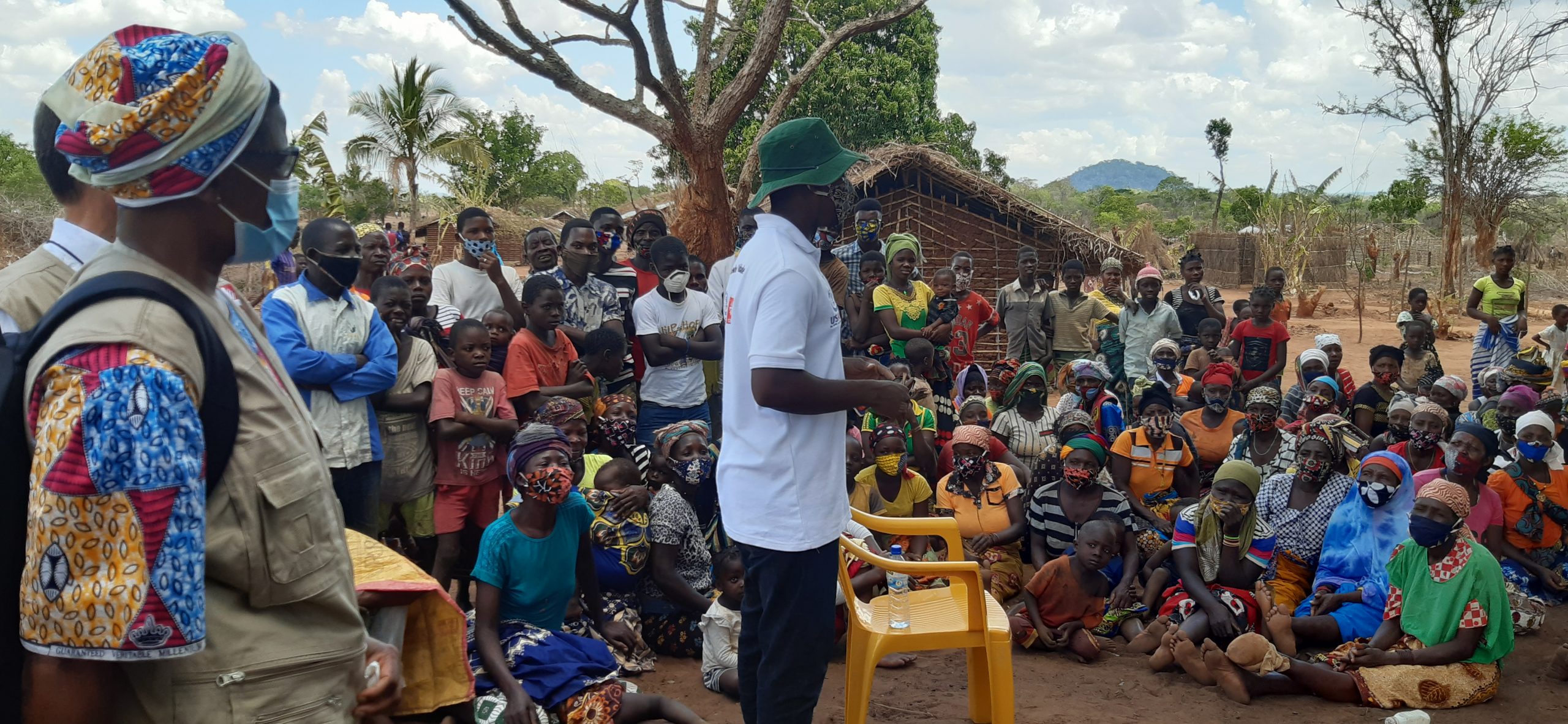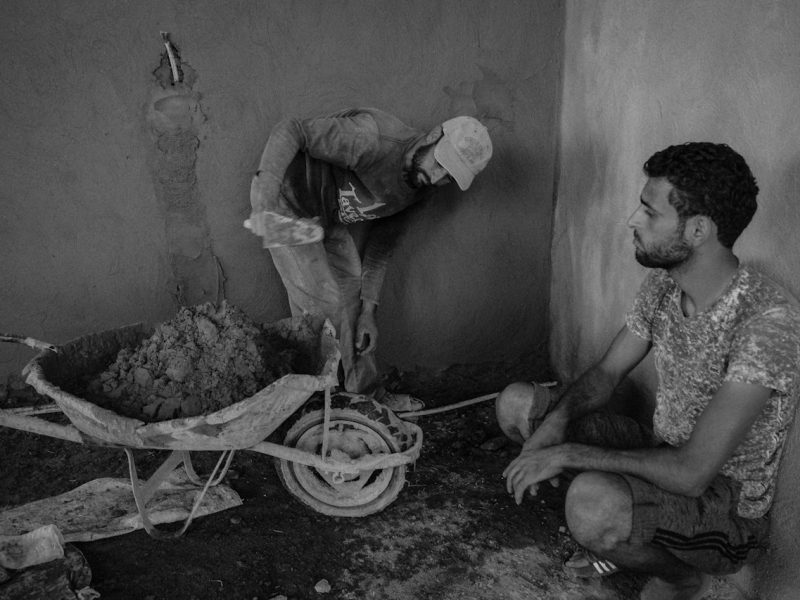

COVID-19 | BULLETIN #32 | 15 December 2020
“May the Lord restore our sight, so as to rediscover what it means
to be members of the human family” (Pope Francis)
Welcoming and integration Initiatives
On 11 December 2020 the Holy Family – amongst the migrants and refugees of all times in the Angels Unawares sculpture installed in St. Peter’s Square, Rome, since 29 September 2019 – was illuminated. This highlights the deep meaning of Christmas and recalls that Jesus, along with Mary and Joseph, were forced to flee to save his life and migrated to safety in Egypt. An identical cast of the same sculpture is “visiting” the Grand Army Plaza in Brooklyn, New York, and was unveiled on 8 December. It is illuminated in a similar way. This is a gesture of twinning which the current time of pandemic needs, when we are all waiting, all linked, all seeking hope. “We have realized that we are on the same boat, all of us fragile and disoriented, but at the same time important and needed, all of us called to row together, each of us in need of comforting the other.” Pope Francis, 27 March 2020
Red Clamor (Clamor Network), with the support of UNHCR and the Latin American Episcopal Council, presented a report (ES) on refugees and migrants from Venezuela who arrived in various Latin American countries to escape the grave situation in their country. Besides sharing the testimonies of Venezuelan refugees and migrants, the report offers a number of recommendations aimed at promoting the protection and over-all development of refugees and migrants in their host communities. The first of the four chapters analyzes the reasons for emigrating from Venezuela; the second examines the transit routes, together with the related risks; the third presents the support and reception network in various cities; the fourth describes the challenges to be faced. A series of recommendations follow, most importantly about the need to achieve greater synergy between Catholic organizations, United Nations agencies, and other national and international organizations, so that together they might promote the integral development of refugees and migrants.
Le Pont (FR) centre (The Bridge), created on the initiative of the Archdiocese of Montreal’s Office of Cultural and Ritual Communities, offers accommodation and services for people seeking asylum. To facilitate the process of integration, Le Pont provides each family with accompaniment and follow-up tailored to their circumstances, with assistance and joint activities from partner organizations. In addition, many Montreal parishes provide support, volunteers, goods, and other donations. An essential part of the work consists in advocacy with local authorities in order to protect and promote the rights of persons seeking asylum and their access to basic services, which is essential for real integration. Le Pont reacted promptly to the pandemic and lockdown: staff was reduced to a minimum, residents were confined to the premises, and related adjustments were made. All necessary information was transmitted to the residents accurately and without panic. When food banks closed, Le Pont faced food insecurity for its guests, but was able to manage the crisis thanks to parish donations. Social networks helped ensure that families would be accompanied. Nevertheless, this has been a difficult time. Those living at Le Pont expressed their concerns during meetings, showed signs of worry, and manifested anxiety about financial insecurity, but also uncertainty about the length of the lockdown. Some people also experienced a resurgence of some of the traumas they experienced during migration. “Integration is not an assimilation which leads one to suppress or forget one’s own identity. For these people, integration means having a place where they feel responsible to participate actively in society. If properly recognised and valued, the skills and competences of migrants, asylum seekers and refugees are a real resource for the societies that welcome them,” says Alessandra Santopadre, director of Le Pont.
Projects in schools and support for education
The closure of schools due to the COVID-19 pandemic has deprived children of a safe space where they can grow and build a future. Education is a fundamental right that opens up the possibility of exercising other rights and, for that reason, it is important that it always be accessible and guaranteed for everyone.
Burundi was one of the few countries in the world where classrooms were not closed due to the pandemic. This allowed Entreculturas (ES) to continue to assist the refugee population in the country, with special emphasis on education. Together with the Jesuit Refugee Service (JRS), Entreculturas has launched an emergency-education project, which aims to promote a safe educational environment for 15,050 Congolese refugee students in primary and secondary schools in Burundi. The project was divided into three phases. The first, already completed, focused on the restoration and construction of classrooms and safety fences around schools. The second phase of work focuses on improving learning dynamics, through training for teachers and in-school support for students with learning difficulties. The third and final phase of the project will be aimed at strengthening the socio-affective ties in the student’s family. Constant accompaniment will encourage the involvement and participation of families in school life and will also help to improve family relations and their ability to support their children.
The Jesuit Refugee Service (JRS) employs scholarships to provide access to university education to vulnerable refugees living in Kenya. In partnership with U.S.-based College for America (CfA) at Southern New Hampshire University and the Global Education Movement, JRS is expected to offer merit-based scholarships to 21 individuals of all ages and faiths. After graduation, students are linked with local and international organizations for three months of in-person and/or virtual internship before they start on their bachelor’s degrees. Scholarship recipients will be expected to undertake CfA-accredited competency-based degree programs in Communication and Business Management. The refugee agency also facilitates career mentorship and other supports upon graduation, aimed at improving the employability of the beneficiaries.
Australian Catholic Religious Against Trafficking in Humans, in collaboration with Catholic Education Melbourne and the Archdiocese of Melbourne, has developed a Resource Kit for transition to a slavery-free environment by creating a slavery-free staffroom or kitchen. Aimed at schools and also for workplaces, parishes, and homes, the kit offers a ‘how-to’ guide to transitioning to new products, awareness-raising resources, and a guide to where to buy slavery-free tea, coffee, and drinking chocolate. The kit is intended for all, but particularly Australian schools. Trafficked or enslaved people who are forced to work in slave-like conditions are among the poorest and most vulnerable, those whom Catholic Social Teaching calls us to care for most of all. By deciding to buy only products certified slavery-free, we can help eradicate child labour, forced labour, and human trafficking and make a difference in our world.
Fratelli Tutti: a message of openness and hospitality
During an online formation session on the Encyclical Fratelli tutti for participants from the World Union of Catholic Women’s Organisations, Cardinal Luis Antonio Tagle highlighted the ways the encyclical inspires us on our path to building a better world of social friendship, universal love, and fraternity. The Cardinal affirmed that Fratelli tutti calls us to take note of a lack of brotherhood and sisterhood: “We should be attentive to how the poor, the forgotten, the neglected are suffering all the more in this throwaway culture,” which is aggravated by a mentality and a context of “being closed” to others. Part of the Pope’s vision of a world open to brotherhood and sisterhood is universal love: “Love is a form of seeking union with others. This is how God loves! This is how God has manifested Himself! This is how Jesus loves and even died for all! This is how the Spirit blows! God who is love is total, full openness.” That, he added, is also illustrated in the parable of the Good Samaritan to which the Pope refers in Fratelli tutti. The openness of the Samaritan led him to approach the stranger left on the roadside and treat him like a brother. Finally, Cardinal Tagle invited his listeners to undertake concrete responses to the appeals in Fratelli tutti, because universal love without genuine response risks remaining a mere concept or a slogan.
Father Fabio Baggio (IT), a Scalabrinian and co-Undersecretary of the Migrants and Refugees Section of the Department for the Service of Integral Human Development, described the Encyclical Fratelli tutti as the Pope’s appeal to welcome and integrate all those who live in the existential peripheries, including migrants. In the encyclical, Pope Francis speaks of citizenship as a fundamental aspect of integration. Fr. Baggio emphasizes that this should be interpreted as active citizenship. It translates into belonging and participation in the community in which a person lives. In order to make this possible, a culture of encounter — as the Holy Father defines it — is necessary. This presupposes and requires an openness to the other, to those who are different. We must not be afraid, writes Fr. Baggio: “Only a weak faith can be called into question.” And then he adds: “Many times people leave to proclaim the Gospel from one continent to another, but today we are offered this opportunity to witness to Jesus by the way we live our lives with those who arrive without ever knowing him, or knowing him but only in a distorted way. How can we miss this chance?”
The other Undersecretary of the Vatican’s Migrants and Refugees Section, Cardinal Michael Czerny (ES; IT), invited participants in an online seminar organized by Sophia University in Tokyo to see the teachings of the Christian tradition and the Encyclical Fratelli tutti as guides for the new generation in shaping a better world after the time of pandemic. The Cardinal said the answer to the crisis can be found in the ancient teachings of the Christian tradition, as is made clear in Fratelli tutti, where the Pope asks us to establish fraternity and social friendship among all peoples and nations. He noted that the pandemic has struck a society in which there is already a “big virus” of social injustice, inequality of opportunity, marginalization, and lack of protection for the weakest, in addition to the “small but terrible virus” of COVID-19. He recalled the Pope’s definition of injustice as a virus from which one can defend oneself with the antibodies of justice, charity, and solidarity. In this regard, the decisive role in creating a culture of fraternity, solidarity and gratuitousness will be played by young people. The founding values for a better society, Cardinal Czerny said, are respect for history, for the elderly, and for creation, and a commitment to social dialogue between generations and to solidarity, always going forward with openness.
Download the bulletin n°32:
For earlier issues of this Bulletin, please visit migrants-refugees.va/c-19-bulletin
We invite you to share this newsletter freely and widely. Please send news to us of the initiatives and good practices you are involved in, so that we can pass on good examples which inspire hope in future newsletters.
If you would like this Bulletin sent directly to your e-mail address, please send a brief request to: media@migrants-refugees.org





